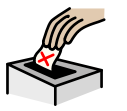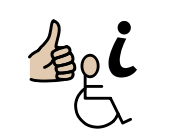Click on a word which is in bold to read what it means.


Judges in Germany have finally said
that taking away voting rights
from people under guardianship
is against the law.
In Germany, more than 85.000 people
were not able to vote.
Now Germany has to change the law.
We hope they will do it
in time for the European elections in May.
This is a great victory
for our German member Lebenshilfe.
Lebenshilfe pushed to change the law.
It is also a great victory
for the whole inclusion movement.
Inclusion Europe’s president Jyrki Pinomaa
said that Germany is a great example
for other countries in Europe.
Together with Spain and Denmark,
it is showing that things are finally getting better
for people under guardianship
in Europe.

But even in countries
where people under guardianship
have full voting rights
elections are often not accessible.
This is a problem,
and it must be changed.
There are positive examples
in some countries.
For example:
· In Sweden, politicians got trained in easy language.
Then the politicians met people with intellectual disabilities.
· Afterwards, in Sweden they added the logos of the parties
to the voting paper.
This helps people understand
who they want to vote for.
· In Scotland, politicians also met
with people with intellectual disabilities.

Self-advocate László Bercse says:
“For me it is very important to vote
at the European elections.
I care about who is going to represent me
in the European Parliament.
I would like the European Parliament
to make decisions
which are good for me
and for other people with disabilities.”
Self-advocate Maribel Cáceres,
got back her right to vote.
Maribel says:
“Everyone has the right to vote.
We should not be discriminated against
because we are disabled.”





